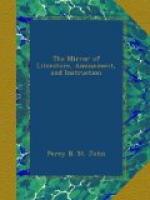humour and stately deportment. He was understood
to be able to maintain a son a student in the theological
classics of the University, at the gate of which the
father was a mendicant. The young man was modest
and inclined to learning, so that a student of the
same age, and whose parents were rather of the lower
order, moved by seeing him excluded from the society
of other scholars when the secret of his birth was
suspected, endeavoured to console him by offering
him some occasional civilities. The old mendicant
was grateful for this attention to his son, and one
day, as the friendly student passed, he stooped forward
more than usual, as if to intercept his passage.
The scholar drew out a halfpenny, which he concluded
was the beggar’s object, when he was surprised
to receive his thanks for the kindness he had shown
to Jemmie, and at the same time a cordial invitation
to dine with them next Sunday, ’on a shoulder
of mutton and potatoes,’ adding, ‘ye’ll
put on your clean sark, as I have company.’
The student was strongly tempted to accept of this
hospitable proposal, as many in his place would probably
have done; but as the motive might have been capable
of misrepresentation, he thought it most prudent,
considering the character and circumstances of the
old man, to decline the invitation.
“Such are a few traits of Scottish mendicity,
designed to throw light on a novel in which a character
of that description plays a prominent part. We
conclude, that we have vindicated Edie Ochiltree’s
right to the importance assigned him; and have shown,
that we have known one beggar take a hand at cards
with a person of distinction, and another give dinner
parties.”
The curious reader who is anxious to pursue the character
still further, will be gratified with “a few
particulars with which his biographer appears to be
unacquainted,”—by a Correspondent
of the Literary Gazette, No. 664.
* * * *
*
UNLUCKY TEXT.
Poor Dr. Sheridan, in an unguarded moment, but in
as guiltless a spirit as characterized the Vicar of
Wakefield, chose for his text, upon the anniversary
of the succession of the House of Hanover, “Sufficient
for the day is the evil thereof.” Although
the sermon did not contain a single political allusion
that could have caused uneasiness, or should have
given offence, yet it was recorded in judgment against
him, and obstructed his preferment ever after.—Southey’s
Colloquies.
* * * *
*
The Naturalist.
* * * *
*
THE AMERICAN ALOE.
[Illustration]




